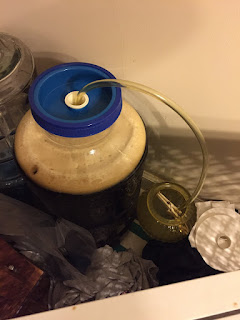C: What's that daddy?
Me: Its a barrel
C: Barrels don't have wheels.
Me: That's true
Now any time we see a barrel he reminds me that they don't have wheels (except at mexitaly - mind blown)
On to the beer. This was case of "what do I put in the barrel next?" I didn't want to put #39 in the barrel for much longer than about 3 weeks so I had to brew the second beer when I racked it into the barrel. I went round and round and ended up with a chocolate oatmeal stout. I didn't want to get cocoa powder residue permanently in the barrel so the chocolate is coming from chocolate malt and possible cocoa extract added to the keg.
Recipe
Batch Size Target (Actual): 6 gal (6 gal)
OG Target (Actual): 1.084 (1.082)
FG Target (Actual) : 1.027 (1.018)
Brew House Efficiency Target (Actual) : 69% (67%)
IBUs: 32
Color: 35 SRM
Style: American Stout
Recipe Type: All Grain
Boil Time: 90 minutes
Water:
Carbon filtered York water
Grains:
16 lbs US 2-Row
2 lbs Flaked Oats
1 lb Chocolate Malt
8 oz Carapils
8 oz Caramel 20L
4 oz Roasted Barley
4 oz Black Patent
Hops:
1 oz German Northern Brewer (pellets) @ 90 min.
0.5 oz East Kent Goldings (pellets) @ 25 min.
0.5 oz East Kent Goldings (pellets) @ 5 min.
Yeast:
WLP002 English Ale Yeast
Brewing Notes
4/6/16 - Yeast Starter:
2 Liter yeast starter: 7c of water, 7oz Extra light DME, 1/2 tsp yeast nutrient, boiled 10 minutes and chilled to room temperature, 2 drops of fermcap, pitched WLP002. Fermented on a stir plate.
4/10/16 - Brew Day:
- Sanitized (star san) my cold side equipment in the big mouth bubbler primary.
- Heated 25 quarts of water with PH 5.2 to 170 in 8 gallon stainless HLT on outdoor propane burner
- Mashed in in 10 gal Igloo cooler, paddled until everything was well mixed and there were no dough balls. 60 minute mash rest
- 0 minutes: temperature was 154F
- 15 minutes: paddled, temperature was 153F
- 30 minutes: paddled, temperature was 152-154F
- 60 minutes, temperature was 152-153F, began vorlauf
- Manual Vorlauf: I run a 2 cup measuring cup full of wort out of the valve and gently pour this on top of the mash. Then I repeat until I'm satisfied with the clarity. This takes about 10-15 minutes.
- Heated 7+ gallons sparge water with pH 5.2 to 195
- Ran off and fly sparged until I had 8 1/8 gallons
- Boil gravity was 15.2% brix - 1.061, right on target.
- Brought to boil - 90 minute boil time
- Added:
1 oz German Northern Brewer (pellets) @ 90 min.
0.5 oz East Kent Goldings (pellets) @ 25 min.
0.5 oz East Kent Goldings (pellets) @ 5 min. - Chilled to 72 F and siphoned to BMB, Volume was 6 gallons.
- Took an OG brix reading of 20.1% which calculated to to 1.082.
- Pitched decanted yeast starter.
Transfer to second use balcones whiskey barrel on 4/29 Measured 10.8% brix which calculated to 1.018. This is quite a bit lower than beersmith predicted.
4/29 - 7/24/16- In Barrel
To prep the barrel this time, after I got #39 out, I gave it a very quick rinse with nearly boiling water 2 or 3 times until the water wasn't cloudy anymore. I fully expect that if some of the previous belgian yeast wanted to take up residence in this beer, it will. I wasn't trying to get rid of it. I let this one go for about 3 months.
7/24/16 - Kegged
Kegged on 7/24 to force carb in the kegerator at about 11psi. I measured 11.4% brix which calculated to 1.023, or about 7.8% ABV. We served a week or so later. Who the heck wants an 8% ABV barrel aged oatmeal stout during the hottest part of the year?
9/23/16 - Bottled
This wasn't getting served frequently enough so the tap was getting stuck closed. We decided to bottle the remaining to make some room in the fridge. #39 was a little flatter than I'd like in the bottle, so my CO2 pressure in my kegerator got bumped up from 10 to 11 psi. I was happier with how the beers we carbonated when served on tap, We'll see how that affects the bottled beer. We bottled 8 22oz bottles and 27 12oz bottles using the "Last Straw" bottle filler. This time the foam was pretty out of hand, resulting in some low-filled bottles that I don't expect will be as bubbly as I'd like. About half way through, I shut the CO2 valve to the keg and as the pressure bled off the bottling process was much better. I think next time we'll try to dial back the pressure at the regulator from the beginning just for bottling, maybe to 3-4 psi.
Tasting
It's big, it's full flavored, it's tasty. It is also improving over time so maybe I'll update this later this winter. One thing I've noticed is the oak and bourbon flavor in this one is much more mellow than in the beers I've made with soaked chips.




















